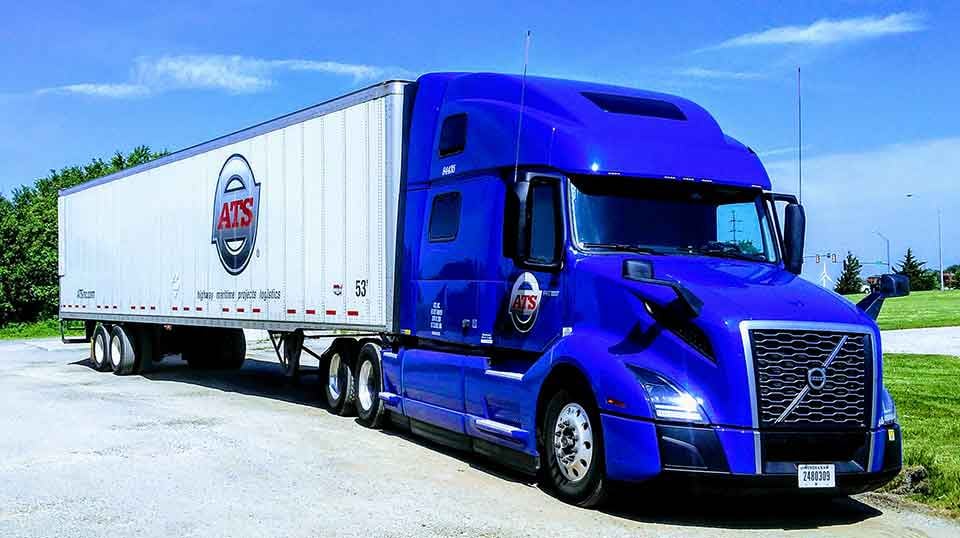
Suddenly, artificial intelligence (AI) is seemingly everywhere — including the transportation industry. AI is rapidly reshaping the logistics landscape, and its influence is felt especially keenly in digital freight brokerage.
In the midst of this AI boom, shippers are wondering: can the move toward AI-powered digital freight brokerage save me money?
It's possible. There are many potential benefits to using a digital freight broker that has incorporated AI tools — and there are possible downsides, too.
At Anderson Trucking Service (ATS), we value innovation and embracing technology. In our 70 years in the transportation industry, we’ve seen a lot of tech-driven changes impact trucking and logistics. While AI is still a relatively new development for transportation and the world writ large, it's already making waves across supply chains.
In this article, we'll explain how AI is currently being applied in digital freight brokerage, the pros and cons of its use, and some forecasting on how AI might push digital freight brokerage and the transportation industry forward in the future.
How Is AI Applied in Freight Brokerage? Core Uses & What They Mean for Shippers
AI applications are revolutionizing essential areas within digital freight brokerage like freight matching, pricing, and analytics, dramatically improving efficiency and customer satisfaction.
Supported by machine learning (ML), natural language processing (NLP), and data analytics, AI has introduced capabilities to digital freight brokerages such as:
- Real-time freight matching
- Real-time dynamic routing and fleet management
- Automated pricing models
- Predictive analytics
- Intelligent, on-demand communication channels
When used strategically, these tools can streamline traditional brokerage tasks, reduce manual intervention, and enable smarter, faster decision-making. Here's a look at some of the most common uses of AI in digital freight brokerage in 2026:
Load Matching Automation
AI algorithms analyze vast data on current shipments, truck availability, historical performance, and market demands to automate the process of matching loads with carriers. This real-time, dynamic approach to carrier selection minimizes empty miles, boosts asset utilization, and matches capacity with demand more responsively than manual systems.
What It Means for Shippers: Faster load matching means faster confirmation that your shipment will move, and with a carrier the algorithm has identified as ideal to move it. More efficient truck usage keeps carriers moving (and making money), which can translate to better capacity access and lower rates in the future.
AI-Powered Pricing and Rate Prediction
Through predictive analytics, AI models assess factors such as seasonality, current and forecasted demand, route congestion, fuel prices, and carrier costs to accurately predict freight rates. Automated rate engines enable brokers to quote competitive yet profitable prices instantaneously, improving win rates and market agility.
What It Means for Shippers: Digital freight brokerage rates are, in general, already more competitive than traditional brokerages. Introducing AI efficiencies into the quoting process means shippers can get a competitive, fair rate and better plan their freight spend.

AI-Enabled Communication and Customer Support
NLP-powered chatbots and virtual assistants provide 24/7 support across multiple channels. They assist shippers and carriers with booking loads, tracking shipments, and answering queries, delivering faster resolutions and enhancing customer experience.
What It Means for Shippers: If you want access to on-call support without the price tag that comes with enterprise-level customer service, AI may be able to fill that gap.
Fraud Detection and Risk Management
AI systems continuously monitor transactions, carrier credentials, and shipment data to detect anomalies and flag suspicious activities. Automated checks help mitigate fraud, prevent double-brokering, and ensure compliance with regulations for safer freight networks.
What It Means for Shippers: A higher degree of security and fraud detection can put shippers' minds at ease and help protect them from costly issues like digital freight theft, carrier fraud, and other losses.
AI-Driven Route Optimization and Operational Efficiency.
One of AI’s biggest transformations in freight brokerage is in route planning and real-time operations. AI-powered software dynamically recalculates optimal routes based on live traffic, weather updates, and delivery constraints. Machine learning models learn from every shipment, refining algorithms and operational processes over time for improved, data-backed decision-making
What It Means for Shippers: Optimized routing leads to faster deliveries, reduced fuel consumption, and better adherence to schedules. Continuous learning empowers continuous improvement, which can set carriers up for ongoing increases in efficiency and reliability that translate to better service for shippers.

Benefits of AI Integration in Digital Freight Brokerage
The practical gains from AI in digital freight brokerage are significant for both shippers and carriers, including:
- Increased speed: Automating repetitive tasks and load matching accelerates brokerage processes. Shippers can get instant, accurate quotes in the matter of a few taps or clicks.
- Enhanced visibility and accuracy: Detailed end-to-end shipment tracking, proactive alerts, and predictive ETAs improve operational transparency, boost on-time delivery rates, and help both carriers and shippers plan with greater confidence.
- Optimized pricing: Intelligent rate tools adjust to market conditions, benefiting all stakeholders.
- Reduced overhead: Back-office automation minimizes costly manual errors, boost operational throughput, and reduce overhead. This frees up staff to focus on more valuable tasks and can translate to better, more streamlined customer service overall.
- Predictive maintenance and fleet health: AI analyzes historical and real-time vehicle data to predict maintenance needs, reducing unplanned downtime and extending asset lifespans for carriers. For shippers, this reduces the risk of in-transit breakdowns and delays.
- Enhanced collaboration and risk mitigation: AI improves transparency among stakeholders, enabling better data sharing and faster issue resolution. Automated risk checks and proactive alerts help prevent problems from escalating, fostering stronger partnerships.
Downsides of AI Integration in Digital Freight Brokerage
While the benefits are substantial, adopting AI in digital freight brokerage comes with its own set of challenges:
- Data quality risk: AI is only as smart as the data it ingests. Inaccurate, incomplete, or outdated data can lead AI systems to make poor pricing, routing, or carrier-matching decisions at scale.
- Lack of transparency: “Black-box” AI models make it difficult for brokers, shippers, and carriers to understand or trust how decisions are made.
- Relationship erosion: Over-optimization for cost or speed can deprioritize reliable carriers and long-term service consistency in favor of short-term gains.
- Limited exception handling: AI struggles with edge cases such as disruptions, last-minute changes, and complex negotiations that still require human judgment. If operations teams are downsized too aggressively under the assumption that "the AI can handle it,” resolution times increase when things break — and they will break.
- High implementation and maintenance costs: AI systems require ongoing investment in data integration, model retraining, monitoring, and internal change management.
- Algorithmic bias: Models trained on historical data can reinforce existing network imbalances, limiting access for smaller or newer carriers and reducing resilience.
- Over-reliance: Excessive trust in AI can weaken human decision-making, slowing response times and increasing risk when the system fails. Instead of augmenting human expertise, AI quietly replaces it until something goes wrong and no one knows how to operate without it.

Future Outlook of AI Adoption in Digital Freight Brokerage
AI is undeniably revolutionizing digital freight brokerage, bringing greater efficiency, transparency, and value to the entire supply chain. As adoption deepens, logistics professionals who embrace these technologies will be positioned to thrive in the evolving transportation landscape. Our future forecast for AI adoption in freight brokerage centers on data security, increased automation, and a balanced approach to AI integration with human expertise.
Ethical, Security, and Regulatory Considerations
As AI systems process sensitive and proprietary information, ensuring data privacy, cybersecurity, and compliance with evolving regulations will become all but mandatory for any transportation provider incorporating AI into its operations.
Brokers and carriers will begin openly addressing their data security and cybersecurity commitments, positioning them as a competitive differentiator for prospective customers. Companies will also begin disclosing their AI use throughout their supply chains and business practices, and investing in technologies specific to data integrity.
Maintaining pristine data (to avoid AI biases), security, and compliance will be a top-tier priority for brokers and carriers moving forward — whether their businesses are digitally-based or not.
Market Growth and Emerging AI-Driven Business Models
The digital freight brokerage market continues to evolve, with AI driving new service models like fully automated brokerages and advanced decision-support platforms. Startups and incumbents alike are racing to embed AI to gain a competitive edge. Many are honing in on self-service, hyper-automated customer experiences as a growth opportunity, which may make brokers feel like they must incorporate as much AI as possible, as quickly as possible.
The most successful digital freight brokers will identify the areas of greatest potential ROI and begin their AI rollout there, practicing continuous testing, tweaking, and optimizing to ensure the efficacy of their models. Rather than transitioning to a fully AI-driven strategy all at once, a step-ladder approach will prevent digital brokers from accidentally building a house of cards upon an imperfect algorithm or AI solution.
Balancing AI Automation With Human Expertise
Strong freight networks are built on strong relationships. While AI excels at data processing and routine decision-making, human expertise is still vital for relationship management, negotiation, and handling exceptions.
It's true that much can be said for the benefits of streamlining of menial processes like submitting paperwork or obtaining tracking updates, but the total removal of person-to-person interaction could create negative outcomes for shippers and transportation providers alike.
Without human oversight, the weaknesses of AI tools can be exacerbated and replicated, causing a ripple effect that may be difficult to rectify, especially if there's little in-house understanding of how the AI at the heart of the processes actually functions. For shippers, this could lead to critical breakdowns in communication, not to mention the risk of costly delays.
The most effective digital brokers will combine the strengths of both AI and experienced professionals. A healthy appreciation for the reality of AI tools — that they are best used to support the humans making decisions for a business, not replace human critical thinking altogether — will help digital brokers to balance people power with the increasing pressures to create a fully automated experience.

What AI-Driven Freight Brokerage Really Means for Shippers
AI is quickly becoming a core component of digital freight brokerage, and its real value for shippers isn’t just automation for automation’s sake. When applied thoughtfully, AI helps remove friction from freight operations by improving pricing accuracy, increasing speed and visibility, reducing administrative overhead, and ultimately lowering total transportation costs.
For all its strengths and opportunities for high ROI, the strongest outcomes emerge when AI augments human expertise rather than replaces it. For shippers, that balance matters. It’s the difference between a brokerage that outsources its entire business — including customer service and relationships — to algorithms and one that uses technology to deliver smarter decisions, steadier service, and measurable savings for its customers.
As AI adoption continues to mature, shippers who understand how these tools are used, and where their limits lie, will be better positioned to choose brokerage models that support both efficiency today and resilience tomorrow.




